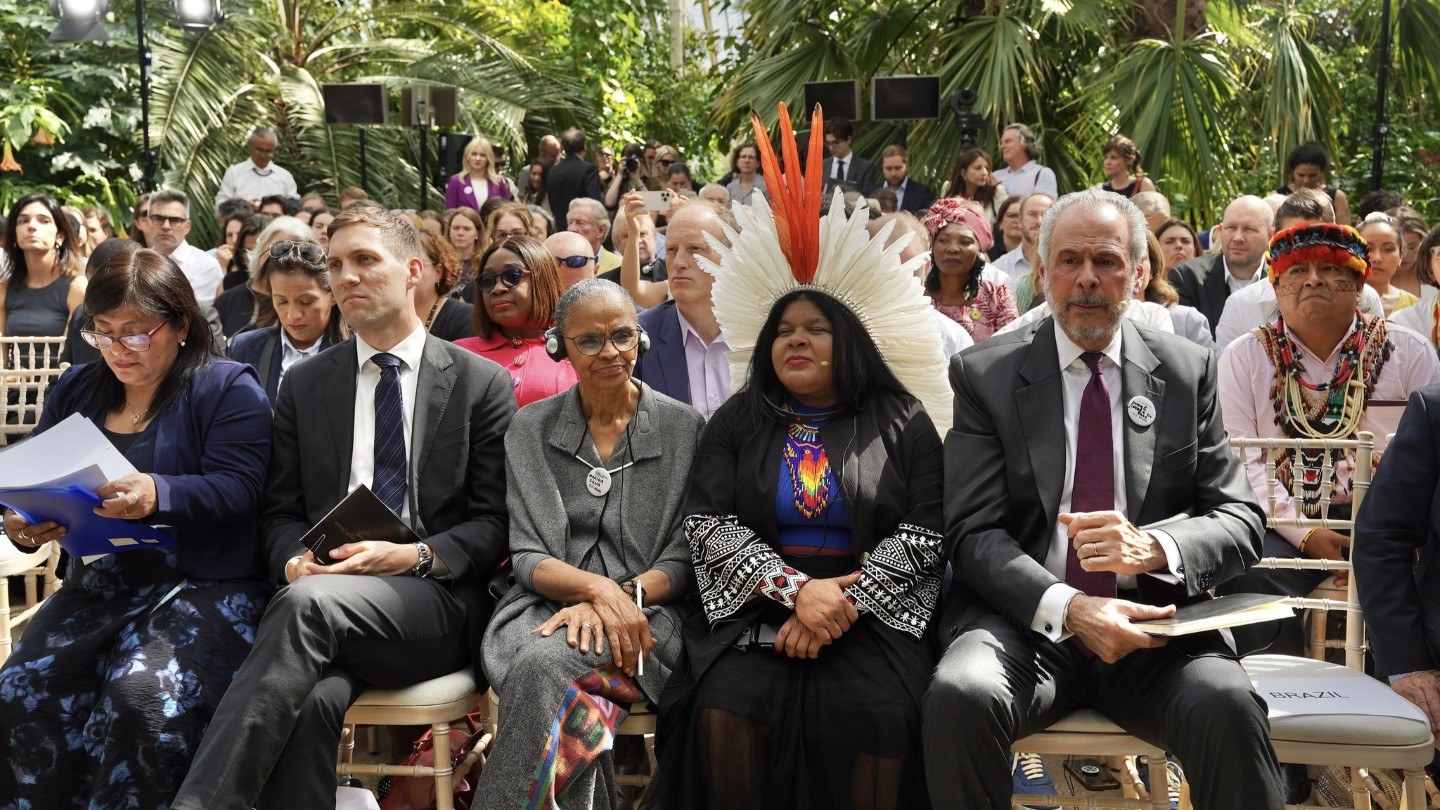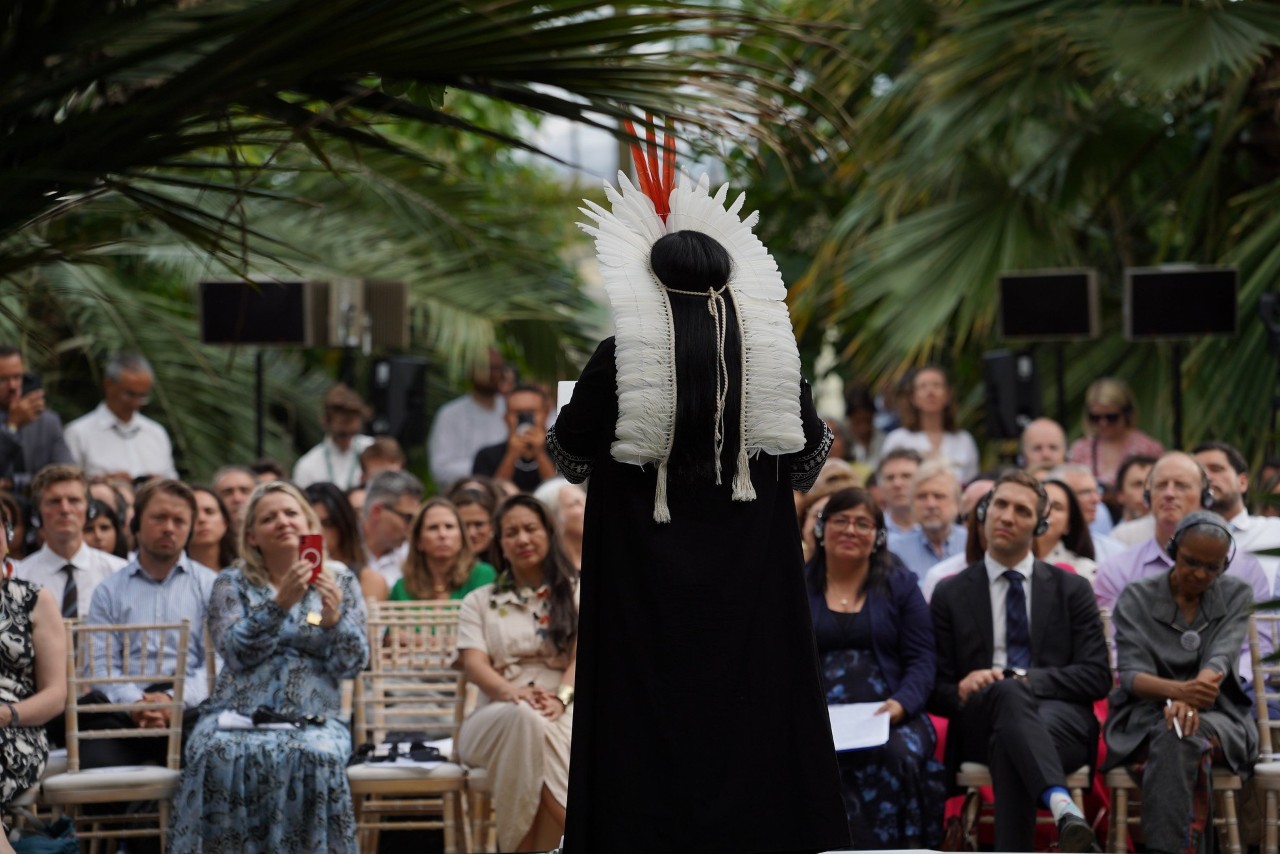Tropical Forests Forever Fund boosts international support and positions itself as a new global model for climate finance
During London Climate Action Week, the Brasil-led COP30 initiative secures support from countries, financial institutions, Indigenous leaders, and civil society organizations

By Ministry of the Environment and Climate Change
From June 19 to 21, during London Climate Action Week, the Tropical Forests Forever Fund (TFFF) made strategic progress toward establishing a new global financing mechanism for conserving the world’s tropical forests. The TFFF is a top financing priority of Brasil’s presidency of COP30, the United Nations climate conference to be held in Belém, Pará, this November.
During a series of high-level panels, bilateral meetings, and collaborative announcements, the TFFF strengthened its global partnerships, highlighted the role it can play in mobilizing long-term financing — critical for public environmental policies — and reaffirmed its role as a link between the public and private sectors for climate and biodiversity.
The TFFF was presented by the Brazilian government during COP28 in Dubai as an innovative mechanism to provide countries with tropical forests with large-scale, predictable, and performance-based payments to maintain and expand forest cover, offering positive incentives aligned with national fiscal planning. It is due to be delivered at COP30.
This week in London, countries that could be supporters of the TFFF - such as the United Kingdom, Norway and the United Arab Emirates—and tropical forest nations potentially eligible to receive payments for conserved areas—such as Colombia, Peru, the Democratic Republic of Congo, Indonesia and Ghana—publicly expressed interest in and support for the initiative.
The TFFF also attracted strong backing from the private sector — including PIMCO, one of the world’s largest bond investment managers; Bank of America; and Barclays — alongside civil society organizations and multilateral institutions, such as the United Nations Development Programme (UNDP). Indigenous leaders also engaged with the fund’s inclusive design process.
“One of my first official trips as Secretary of State for Energy Security and Net Zero was to the Amazônia, because I recognized how vital that ecosystem—and tropical forests more broadly—are for all of us,” said Britain’s Secretary of State Ed Miliband. “That’s why the emergence of Brasil’s brilliant proposal, the Tropical Forests Forever Fund, is so exciting. We see it as a bold, inspiring, and deeply promising solution, and we are proud to work alongside the Brazilian government. This fund offers an opportunity for the Global North and South to unite as a coalition of the hopeful and the determined in a world full of uncertainty.”
For Andreas Bjelland Eriksen, Norway's Minister for Climate and Environment, "the TFFF has the potential to transform the way we finance tropical forest protection. For it to succeed, it must have robust environmental and social safeguards, broad support from tropical forest countries and indigenous peoples, and committed funding from both traditional donors and new partners. Norway is considering contributing, and we encourage others to do the same."
Countries with large areas of forest also discussed the TFFF during the event in London, one of the main forums for discussing the global fight against climate change.
"Indonesia believes that the future of our planet is deeply rooted in the health of its forests. In this context, we see the TFFF not only as an initiative led by Brasil, but as a transformative opportunity for all countries with tropical forests—a platform to advance innovation, equity and ambition in global climate solutions," said Haruni Krisnawati, Senior Advisor to the Minister on Climate Change at the Ministry of Forestry of the Republic of Indonesia.
Professor Joseph Malassi, climate advisor to the Minister of Environment and Sustainable Development of the Democratic Republic of Congo, said that his country "strongly supports the Brazilian government's initiative to establish the TFFF, which we see as a transformative and timely response to the persistent gaps that Congo Basin countries have been highlighting in several international forums. We call on bilateral, multilateral, and private partners to work with us to ensure that the TFFF is fully capitalized, transparent, accessible, and equitable. Tropical forests cannot wait; the future of our forests must be treated with the necessary urgency and solidarity."
Mr. Christian Stracke, President of PIMCO, congratulated the members of the TFFF working group for their ambitious efforts to preserve forests. "We welcome the TFFF as an innovative model with the potential for scale and self-sufficiency. This inclusive mechanism can mobilize private capital on a large scale, while helping to mitigate economic risks associated with biodiversity loss and forest degradation."
The Global Alliance of Territorial Communities (GATC) said it sees "the TFFF as more than just a financing mechanism — it is an opportunity to broaden the debate on what direct financing for indigenous peoples and local communities can and should be. By putting the voices of nature's guardians at the center as partners and co-authors of the process, the TFFF represents a chance to recognize our historic demand for direct financing, setting a new standard for other global financial mechanisms."

Brasil's Minister for the Environment and Climate Change, Marina Silva, who attended the London Climate Action Week and held a series of meetings focused on the instrument, said that "the TFFF is a robust and innovative mechanism for public and private investment, which directs resources directly to those who conserve forests—guaranteeing at least 20% for indigenous peoples and local communities. It will mobilize large-scale capital with perennial flows to preserve our biodiversity. As we approach COP30, we need the boldness to create a new pact between climate and forest, helping to create a new cycle of prosperity. This requires the courage and disruptive capacity to change - before we are abruptly changed by climate adversity."
Also present at the debates on the TFFF in London, the Minister for Indigenous Peoples, Sonia Guajajara, said that her portfolio would "continue to work, jointly between the government and indigenous organizations, to engage countries in building the TFFF and to ensure that Indigenous Peoples and Local Communities receive a minimum of 20% of the funds raised, because it has already been established that only 1% of all the resources that are traditionally mobilized for climate change reach indigenous territories. Therefore, I see the TFFF as an innovative and structural mechanism."
Tropical Forests Forever Fund (TFFF)
The TFFF’s financing model combines public investment with private market fundraising, aiming to mobilize about USD 4 billion annually for distribution among countries with tropical forests. Countries will receive payments proportional to their conserved areas of tropical and subtropical moist forests only upon satellite imagery confirms that deforestation levels remain below a defined threshold. Deductions will apply for every hectare deforested or degraded.
This amount represents three to four times the discretionary budgets of Environment Ministries in major forested countries—and tens or even hundreds of times more than what is currently paid through the voluntary carbon market. Consequently, the TFFF can have a transformative impact on national forest conservation policies.
The TFFF differs from traditional models through several key features: it operates as a revenue-generating investment fund, not a donation-based mechanism; it pays for results, rather than funding projects; it rewards standing forests, instead of compensating for avoided deforestation; and it maintains close dialogue with Indigenous Peoples and local communities, who play a direct role in forest protection. The mechanism proposes to allocate at least 20% of national payments to these populations.
Tropical forests regulate the global climate, harbor irreplaceable biodiversity, provide freshwater, and support the livelihoods of billions of people. Humanity’s survival depends on them. The TFFF offers a transformative opportunity to significantly expand financial support for tropical forest countries.
English version: Trad. Bárbara Menezes.
Proofreading by Enrique Villamil.
